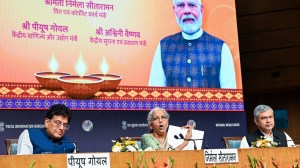The inhuman cliches of history
It is almost impossible to read any public references to Indian history these days without feeling a profound sense of claustrophobia. Polem...

It is almost impossible to read any public references to Indian history these days without feeling a profound sense of claustrophobia. Polemicists witlessly unmask traitors. Pseudo profound commentators gravely claim to reveal the essence of Indian history. Sometimes pracharaks, occasionally comrades, use history to carpet bomb logic, morality and fact alike. Even professional historians are busier unmasking each others supposed politics than writing history. And the identities of all citizens are pitilessly aligned to their views on history.
Your secularism is judged by your views on medieval India, your commitment to social justice by your fidelity to Ambedkar, your liberalism by your obeisance to Nehru, your nationalism by your allegiance to Savarkar and your respect for Bengal by your belief in Subhas Chandra Bose’s capacity to survive an air crash and live beyond 100 years. We have reached a point where there is literally no ground for anyone to stand on without being accused of something. If you admire some aspects of Hinduism you are a closet Hindu nationalist; if you criticise Hinduism you become a closet Marxist. If you admire the contributions of Islam, you might be a traitor; if you criticise Islam you become a communalist. If you invoke tradition, you are a reactionary, if you don’t you are simply agents of the West. If you have doubts about the interpretations of Indian history given by some eminent historians you are likely to be a fascist; if you don’t have any doubts it must be because you are a ‘leftist.’ Treading down the path of history will invite an ascription of identity and intellectual allegiances, and attribution of motives and sensibilities, you will never be able to escape.
Then there is the fatal conjunction of two concepts that should not belong together: history and respect. The insistently coercive demand that this or that figure always be publicly respected exemplifies both a conceptual fallacy and dangerous political pathology. We have converted the idea of respect into a coerced external liturgy, something that should be turned on at demand, not something that is a function of your own beliefs. So respect means bowing your head, saying things about people you do not actually believe, and disabling your own sense of judgment. We convert respect into a performance so that it is drained of all content. The demand for respect has become an insidious threat to freedom and individuality. Don’t think you own thoughts, don’t express your true feelings, just do as commanded.
The insistent demand for respect reveals a politics that oscillates between the infantile and the fascist. The term ‘fascist’ is used and abused much too freely. But watching the way we rally around dead leaders and convert them into cardboard icons, reminds one of the commandments Mussolini use to give his followers: Mussolini is always right. Like automations everyone had to parrot it. The content of what the leader might have said and done mattered very little. What was of importance was that the leader was a ‘representative’ man, a slight to him was a slight to the self. And mobs went out rampaging, erasing all signs of ‘disrespect.’ It is difficult to imagine a genuine freedom surviving ideologies that aim to cleanse the public space of all dissent, that aim to denude it of all thought, so that all that is left is a ritualistic obeisance to a leader who happens to be the flavour of the month.
The claustrophobia of the public sphere is that there is no room for thinking, in any genuine sense of that much impoverished term. History has become closely aligned to claptrap of tribalism. Our discourse of history has become suffocating because our identities determine our beliefs about the past, not the other way round. We are no longer products of our history, our history is a product of who we are. History is bound and confined by our identity. It has no place for curiosity, for intellectualism, for subtle irony, for the variousness of human experience. It stakes are high because our self is at stake. But because our self is at stake, our history will brook no discussion, tolerate no dissent and, allow no humour. The claustrophobia of history that we have surrendered ourselves to requires a fuller diagnosis than we currently have. Certainly the risk that history becomes aligned with identity, respect and an utter lack of genuine curiosity is endemic to nationalist historical aspirations. A teleological history premised on the thought that all of our past was simply a seamless contrivance to bring the nation into being is bound to denude history itself of any genuine interest. It is a paradox of our times that precisely the most talked about figures, Savrakar and Nehru, Gandhi and Ambedkar, have become the most unknown of all figures, obscured by an excess of superintendence and lost under a fog of piety.
But deploying history in the cause of revolution or emancipation is no less pernicious. In their propensity to see meaning where there is nothing but capricious wills of wayward human beings, left histories have also induced a simplified attitude towards history, one that has no room for complications and reversals. The claustrophobia of our historical discourse demands two radical gestures, one methodological one moral. The great historian Richard Cobb once recalled his favourite uncle, a country doctor who took the young Richard with him on his rounds.‘‘He was a tremendous gossip, and endlessly inquisitive about people; indeed I think he practiced medicine in order to get into other people’s houses. I would sit waiting in his car and after, each visit, he would come to the car triumphantly with some new item of malice, rather like a researcher after a good day in the Archives Nationales.’’ Just as his Uncle desired to get into other peoples’ homes, so Richard Cobb got an obsessive desire to breach other lives. But the purpose of this enterprise was to make the historian unsettle certainties, not pander to them, to deflate the pretensions of heroes (or more accurately, those of their followers), not to elevate them to the status of gods. This was an interest in history driven, like David Hume’s, by a fundamental interest in human nature in all its caprice and malice, in all its greatness and propensity for evil, and not by a search for historical meaning.
The only way to liberate history is to liberate it from the claustrophobia of meaning. The second radical gesture we need is Gandhi’s: history on the one hand, and identity and morality on the other need to be prized apart from each other, through an act of artfully contrived naivete. The only way to lower the stakes of history is to see it as not having any bearing on our morality and sense of self. History, as Gandhi argued, is too much of a minefield, too much of a trap for it to reliably serve the cause of morality, or for it to create a healthy sense of the self. And what goes by the name of history is more a mirror of our insecurities than a cure for them. History should be made unimportant enough to be left to the historians. This is the only cure for the claustrophobia of history that surrounds us. We need to able to crack jokes about our past and we need to get a life beyond an obsession with history. Or else, our freedom will be at risk.
The writer is president, Centre for Policy Research



- 01
- 02
- 03
- 04
- 05




























